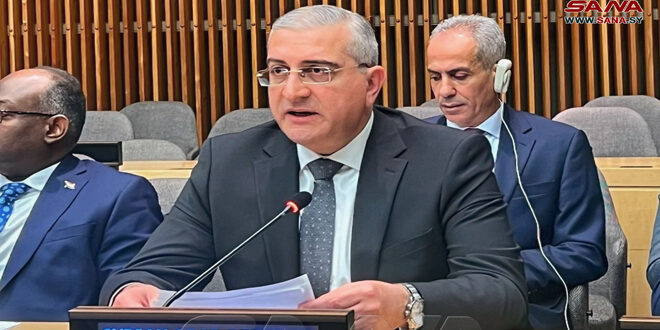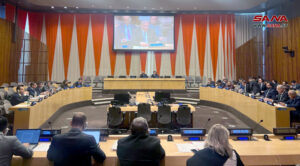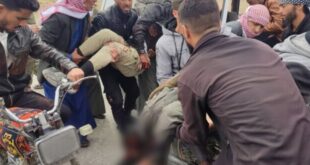New York, SANA-Syria’s Permanent Representative to the United Nations, Ambassador Qusay Al-Dahhak, stressed that the attacks of Israeli occupation and its possession of weapons of mass destruction of various types, especially nuclear weapons, require more than ever to work on establishing a zone free of these weapons in the Middle East.
This came during the 5th session of the conference on establishing a zone free of nuclear weapons and other weapons of mass destruction in the Middle East, held at the United Nations headquarters in New York.
Al-Dahhak pointed out that efforts to establish a zone free of weapons of mass destruction cannot be fruitful unless they deal with the serious threat to regional and international peace and security posed by the entity’s arsenals of nuclear, chemical and biological weapons of mass destruction, stressing the necessity of ending the aggression and holding the occupation authorities accountable for their crimes.
He criticized the protection provided by some Western countries, most notably the US, to the Israeli entity, which contributed to Israel’s monopoly in the Middle East region in possessing and developing weapons of mass destruction, and Israel’s persistence in refusing to join the Non-Proliferation Treaty as a non-possessor party and subjecting its nuclear facilities to the supervision of the International Atomic Energy Agency.
Al-Dahhak stated that the only obstacle hindering the efforts of the conference to establish a zone free of nuclear weapons and other weapons of mass destruction in the Middle East is the absence of Israeli entity from participating in its work and in all the requirements for establishing this zone with the support of the US.
Al-Dahhak renewed Syria’s call to the International Atomic Energy Agency (IAEA) to assume its responsibilities and take the necessary measures to uncover the Israeli nuclear program and subject it to the comprehensive safeguards system and the systems of monitoring nuclear facilities and programs in the agency
Syria was one of the first countries to join the Treaty on the Non-Proliferation of Nuclear Weapons (NPT), it signed a comprehensive safeguards agreement with the IAEA and signed the Biological Weapons Convention, as well as it joined the Chemical Weapons Convention (OPCW), and fulfilled all its obligations, Al-Dahhak noted.
Al-Dahhak stressed the need to guarantee the right to peaceful uses of nuclear energy, chemical and biological materials for the States Parties and to facilitate their access to relevant technologies for peaceful purposes without any obstacles.
Latifa Moammar /Nisreen Othman
 Syrian Arab News Agency S A N A
Syrian Arab News Agency S A N A


